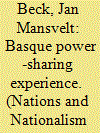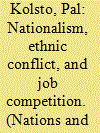|
|
|
Sort Order |
|
|
|
Items / Page
|
|
|
|
|
|
|
| Srl | Item |
| 1 |
ID:
080802


|
|
|
|
|
| Publication |
2008.
|
| Summary/Abstract |
Neither the devolution of powers to the Basque Autonomous Community in Spain nor more than a decade of power-sharing within this region has led to a peaceful settlement of the Basque conflict. Combining Kriesberg's approach to conflict resolution and consociational theory, past power-sharing experiences are analysed. The lack of overarching loyalties, traditions of compromise, comprehensive participation and the continuation of violence have frustrated power-sharing. After the 2006 ceasefire, the conditions for giving the conflict a constructive turn have not fundamentally changed. The potential for alternative forms of power-sharing as a way out of the Basque conflict, combined or not with innovative territorial arrangements cannot be employed because of multi-scale polarisation. De-escalation as a prerequisite for new types of power-sharing arrangements requires relearning democratic pluralism and a recognition of ethnic hybridity in this politically and geographically fragmented society
|
|
|
|
|
|
|
|
|
|
|
|
|
|
|
|
| 2 |
ID:
080805


|
|
|
|
|
| Publication |
2008.
|
| Summary/Abstract |
This article deals with patterns of consumption and of advertisement, as a field for the analysis of two major processes in the Palestinian society of Mandate Palestine: the growth of an urban middle class and the consolidation of the Palestinian national movement. The advertisements, sampled from the popular daily paper Filastin, analysed in the context of political and economic events, highlight the complex interplay between nationalism and class formation, and the contradictory tensions between the two processes. A smaller sampling in al-Difa' points to similar, though not identical, trends. This analysis also highlights new dimensions of the Jewish-Arab conflict by drawing attention to the semi-private sphere of consumption which appears to have been less segregated than the more often studied political and economic spheres
|
|
|
|
|
|
|
|
|
|
|
|
|
|
|
|
| 3 |
ID:
080807


|
|
|
|
|
| Publication |
2008.
|
| Summary/Abstract |
Among the markers of ethnonational identity, language and religion have figured with equal prominence. In many cases, religion has been the bedrock of nation-building; and even today, it is difficult to separate a number of national identities from their religious matrices. Religious identity is based on, and perpetuated in, narratives expressed in a specific language. Language and religion are related; in our secular age, however, that relationship is no longer consistent. The two may feed upon one another; language may substitute for religion; or religion may trump language. This article explores the varying relationships between language and religion.
|
|
|
|
|
|
|
|
|
|
|
|
|
|
|
|
| 4 |
ID:
080806


|
|
|
|
|
| Publication |
2008.
|
| Summary/Abstract |
The article examines the effects of job competition on ethnic relations within a multinational state. It argues that demographic increase leads to competition for blue-collar jobs while an increase in the number of graduates from higher education leads to competition over elite jobs. In the first case, people risk unemployment, in the second, blocked career opportunities. Mass-level unemployment may lead to anger-driven mass riots, while an intelligentsia will formulate more rational strategies to eliminate threatening competitors from the labour market. One such strategy is to insist that the state ought to be a national state, in which the national elites will be in control. While questions of identity no doubt also may have an enormously mobilising power in times of national resurgence, identity issues are normally intimately intertwined with interest politics. These mechanisms are traced in the history of ethnic mobilisation in the Soviet Union and the post-Soviet states during and after perestroika
|
|
|
|
|
|
|
|
|
|
|
|
|
|
|
|
| 5 |
ID:
080803


|
|
|
|
|
| Publication |
2008.
|
| Summary/Abstract |
Outlining Ireland's long history of ethno-national conflict, and the recent protracted 'peace process' in Northern Ireland, contextualises a critique of the problems underlying such conflicts, and the difficulties in transforming externally imposed conflict management into self-sustaining conflict resolution. It is argued that the problems and difficulties are deeply rooted in a thoroughly modern complex of nationalism, ethnicity, sovereignty and representative democracy. These are knotted together in a common denominator of territoriality, and the nub of the problem is the 'double paradox' of democracy's undemocratic origins in the present. Territoriality, the use of bordered geographical space, is a powerful and ubiquitous mode of social organisation which simplifies social control. But it can grossly oversimplify and distort social realities, particularly at borders and especially where territory is contested, thereby reinforcing other distorting simplifications typically found in ethno-national conflicts. In consequence, radical remedies are needed if the problems are to be overcome. Making ethno-national peace paradoxically calls for more creative border-crossing conflicts around other issues
|
|
|
|
|
|
|
|
|
|
|
|
|
|
|
|
| 6 |
ID:
080804


|
|
|
|
|
| Publication |
2008.
|
| Summary/Abstract |
This paper makes two main arguments. First, federalism in Canada, properly conceived, is a system which evolves as a result of struggles over the norms of mutual recognition between territorially based groups. Second, if federalism is to work as a way of accommodating national minorities, the role of the judiciary in adjudicating this relationship must be taken into account, because it plays an integral role in the continuing contestation of the arrangement.
I begin with the 'problem' of national minorities in the nation-state system and why federalism is espoused as a solution for alleviating tensions, focusing on Canada. I then turn to review the relevant jurisprudence of the Supreme Court of Canada (SCC) in adjudicating the federal arrangement. Finally, considering this jurisprudence, I reflect on why it is important to account for the role of the Court when promoting federalism to accommodate national minorities. I go on to argue that a dialogical approach to federalism, as opposed to a monological one, is best suited to do this.
|
|
|
|
|
|
|
|
|
|
|
|
|
|
|
|
|
|
|
|
|